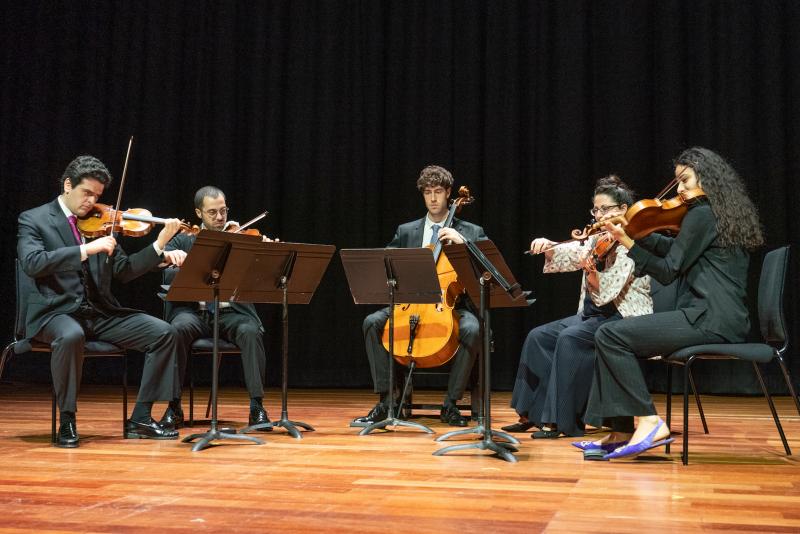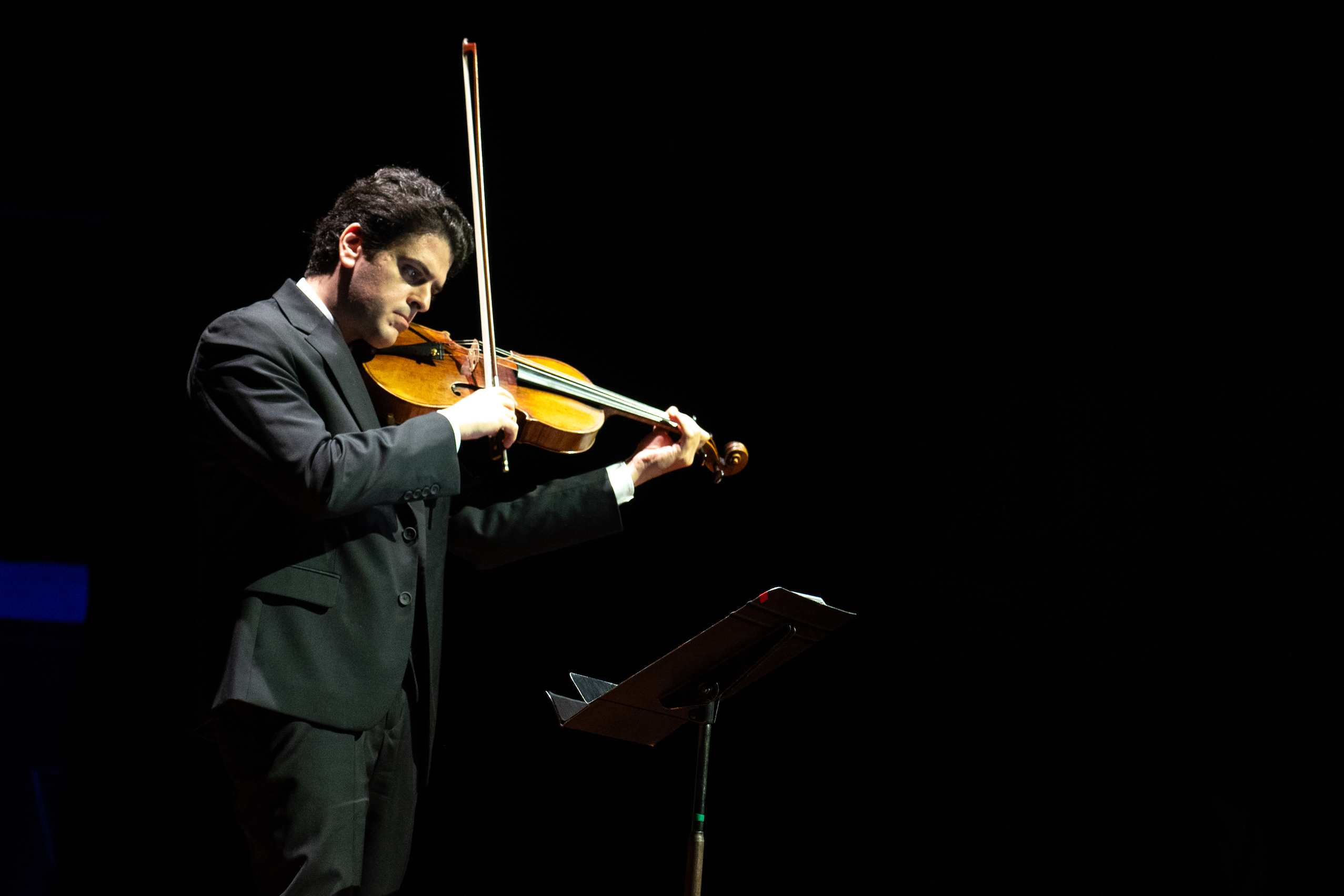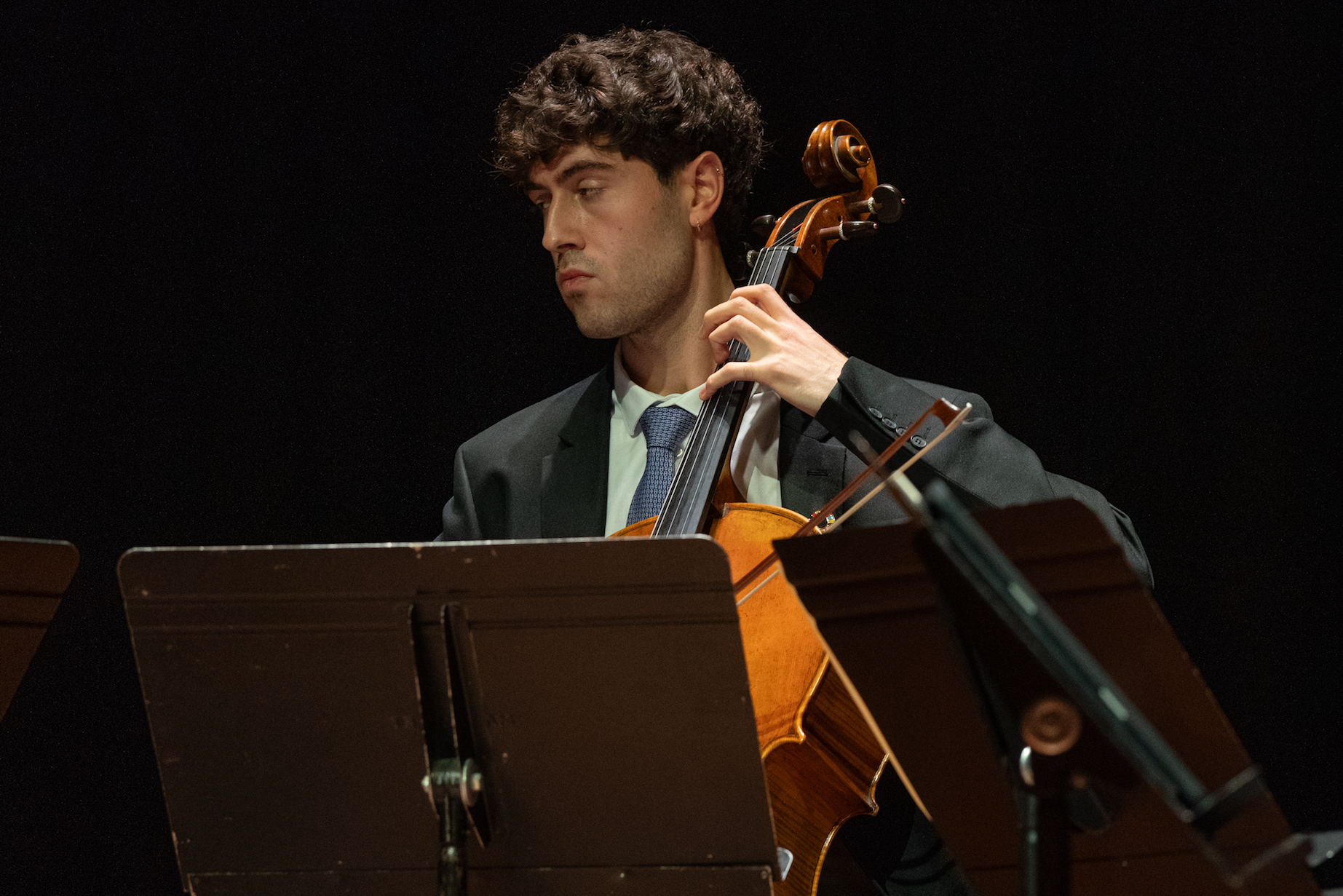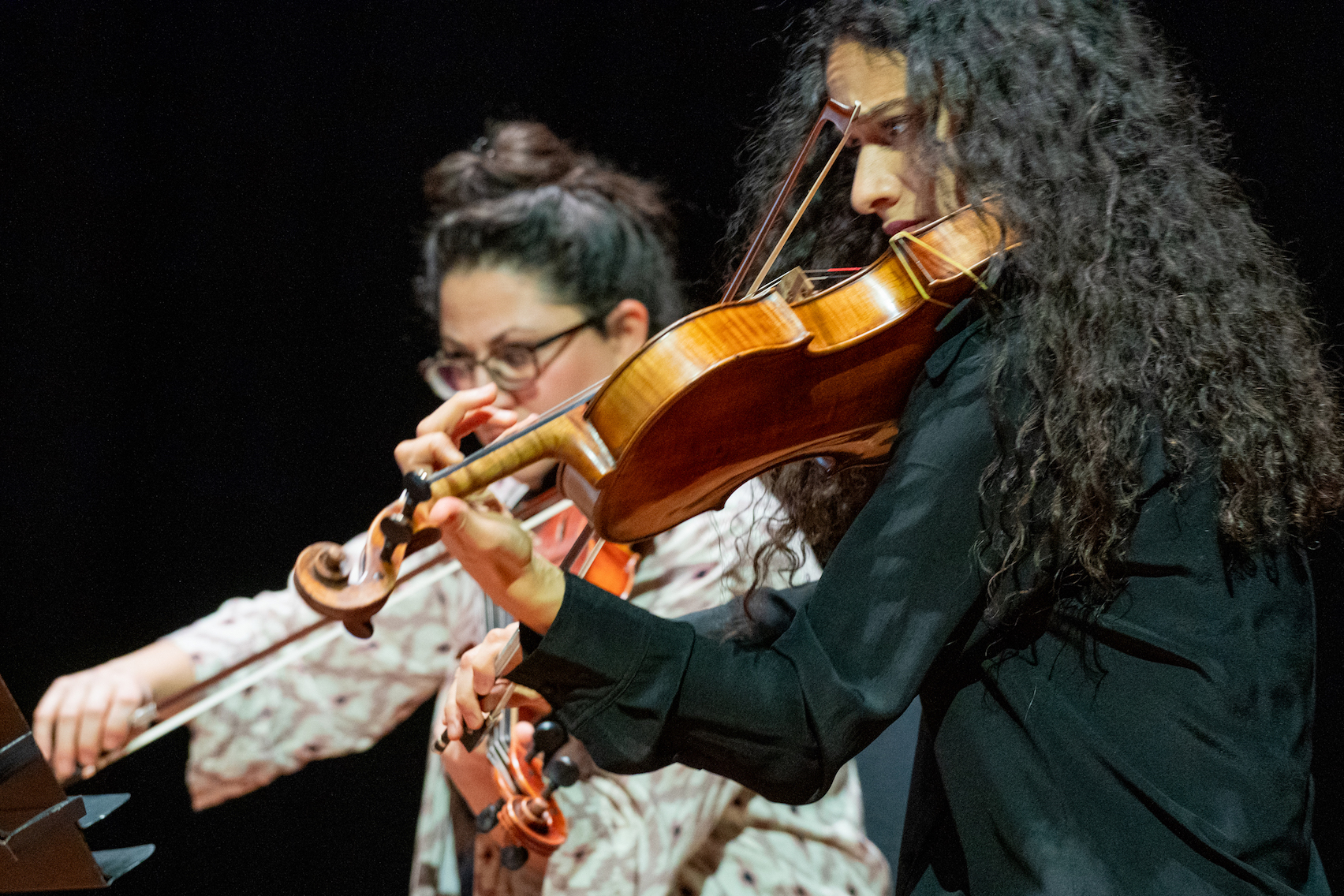West-Eastern Divan Ensemble, Michael Barenboim, QEH review - enchantment and conviviality | reviews, news & interviews
West-Eastern Divan Ensemble, Michael Barenboim, QEH review - enchantment and conviviality
West-Eastern Divan Ensemble, Michael Barenboim, QEH review - enchantment and conviviality
In fearful times, a precious enclave of musical grace

What a month, and what a day, for Michael Barenboim to bring the West-Eastern Divan Ensemble to London.
First spun off from the main orchestra in 2019, and led by the co-founder’s violinist son, the chamber ensemble came to the Queen Elizabeth Hall on Saturday with a programme that – intentionally or not – defied the times in its grace, charm and elegant conviviality. For two enchanted hours, the WEDE players lightened our darkness and held our fears at bay.
At the concert’s heart stood two works of consummate congeniality: Mendelssohn’s 1845 string quintet in B flat, and Beethoven’s septet in E flat for strings and woodwinds – a piece so popular in its day that the composer, typically, came to detest it. Cleverly, Barenboim junior intercut these supremely sociable pleasures with three winning late miniatures by Elliott Carter, all written shortly before or even after the American master’s 100th birthday in 2008. Imagine Mozart composing in 1856 as a contemporary of Wagner, or even a centenarian Schubert coexisting with young Schoenberg in 1897… The compressed sound-world of these witty fragments nicely complemented the major pillars of the gig, and emphatically proved that musical good humour did not die with tonal orthodoxy.
 As an hors d’oeuvre, Barenboim himself (pictured above) took up the viola for Carter’s solo “Figment IV”: an almost Bach-like journey from meditative solemnity to glittering exuberance within a few packed minutes. The Mendelssohn quintet – with Barenboim as first violin, partnered by Hisham Khoury, with violists Miriam Manasherov and Sindy Mohamed, and cellist Assif Binness – featured fine-grained and mutually responsive ensemble playing, its presiding mood of light-footed agility deepened by flashes of virtuosic passion.
As an hors d’oeuvre, Barenboim himself (pictured above) took up the viola for Carter’s solo “Figment IV”: an almost Bach-like journey from meditative solemnity to glittering exuberance within a few packed minutes. The Mendelssohn quintet – with Barenboim as first violin, partnered by Hisham Khoury, with violists Miriam Manasherov and Sindy Mohamed, and cellist Assif Binness – featured fine-grained and mutually responsive ensemble playing, its presiding mood of light-footed agility deepened by flashes of virtuosic passion.
As he did throughout the evening, Barenboim led with a gusto tempered by refinement, and a lovely cantabile violin voice. The work’s extra viola, and the weight and depth it brings, lends much of the writing the atmosphere of a pocket-sized concerto for violin and string band. The WEDE players negotiated its textural and emotional shifts with an effervescent togetherness. The highlight, however, came in the gorgeous, operatic adagio, with the yearning, stricken beauty of Barenboim’s violin offset by the plangent warmth of the viola and cello parts. The heter-sketer bustle and brilliance of the finale – Mendelssohn even thought it too superficial – solaced and uplifted us, Barenboim’s sparkling passagework dancing freely against his colleagues’ robust backdrop. After which, Carter’s “Au Quai” for bassoon and viola, with Barenboim joined by Mor Biron, rounded off the first half in a tenderly amusing Laurel-and-Hardy dialogue of romance against earthiness. As in the best double-acts, Biron’s comic, deflationary bassoon claimed its lyrical moments of transcendence too.
 Before the Beethoven Septet, Assif Binness and Barenboim made Carter’s “Duettone" for violin and cello into a dramatic conversazione between equals, with piquant cello pizzicato challenging drone-like figures on the violin. Then, in the Septet itself, we heard the flair and force of this ensemble’s brand of cooperation come to the fore across its instrumental range. From first to last, pride of place went to clarinettist Daniel Gurfinkel, silkily nimble in his merrily rivalrous to-and-fro with and against Barenboim’s dashing, skipping violin. If the violin played charismatic leader, the clarinet was ever eager to to vie for the neatest tunes and the most dazzling runs.
Before the Beethoven Septet, Assif Binness and Barenboim made Carter’s “Duettone" for violin and cello into a dramatic conversazione between equals, with piquant cello pizzicato challenging drone-like figures on the violin. Then, in the Septet itself, we heard the flair and force of this ensemble’s brand of cooperation come to the fore across its instrumental range. From first to last, pride of place went to clarinettist Daniel Gurfinkel, silkily nimble in his merrily rivalrous to-and-fro with and against Barenboim’s dashing, skipping violin. If the violin played charismatic leader, the clarinet was ever eager to to vie for the neatest tunes and the most dazzling runs.
Nor were these two the sole stars: Binness’s cello, Biron’s bassoon and Ben Goldscheider’s deftly characterful horn made their presence pleasurably felt – especially, for Goldscheider, in Beethoven’s variations on a Rhenish boatman’s song, “Ach Schiffer, lieber Schiffer”. Here, as elsewhere, Manasherov and Mohamed’s violas (pictured below) enriched the sonic palette with a warm assurance. And, in the scherzo, David Santos Luque’s bass grabbed its own place in the sun. In the finale, Barenboim’s airborne cadenza set the seal on a performance that – here and in the Mendelssohn – edged towards foreboding and disturbance only to find refuge in a genial collegiality.
 Jubilant togetherness banished the spectre of tragedy – and WEDE lifted our spirits further with a stylishly joyous encore of the third-movement allegro from Schubert’s Octet. In both of the big chamber works, the QEH audience applauded between movements with a vehemence that purists might have scorned. But they did so out of affection and admiration for the WEDE players and the fragile dreams they represent. In our little temporary enclave of grace and goodwill, these emissaries from a happier world deserved all the love they got.
Jubilant togetherness banished the spectre of tragedy – and WEDE lifted our spirits further with a stylishly joyous encore of the third-movement allegro from Schubert’s Octet. In both of the big chamber works, the QEH audience applauded between movements with a vehemence that purists might have scorned. But they did so out of affection and admiration for the WEDE players and the fragile dreams they represent. In our little temporary enclave of grace and goodwill, these emissaries from a happier world deserved all the love they got.
rating
Share this article
The future of Arts Journalism
You can stop theartsdesk.com closing!
We urgently need financing to survive. Our fundraising drive has thus far raised £49,000 but we need to reach £100,000 or we will be forced to close. Please contribute here: https://gofund.me/c3f6033d
And if you can forward this information to anyone who might assist, we’d be grateful.

Subscribe to theartsdesk.com
Thank you for continuing to read our work on theartsdesk.com. For unlimited access to every article in its entirety, including our archive of more than 15,000 pieces, we're asking for £5 per month or £40 per year. We feel it's a very good deal, and hope you do too.
To take a subscription now simply click here.
And if you're looking for that extra gift for a friend or family member, why not treat them to a theartsdesk.com gift subscription?
more Classical music
 BBC Proms: Jansen, Royal Concertgebouw Orchestra, Mäkelä review - confirming a phenomenon
Second Prom of a great orchestra and chief conductor in waiting never puts a foot wrong
BBC Proms: Jansen, Royal Concertgebouw Orchestra, Mäkelä review - confirming a phenomenon
Second Prom of a great orchestra and chief conductor in waiting never puts a foot wrong
 BBC Proms: Royal Concertgebouw Orchestra, Mäkelä review - defiantly introverted Mahler 5 gives food for thought
Chief Conductor in Waiting has supple, nuanced chemistry with a great orchestra
BBC Proms: Royal Concertgebouw Orchestra, Mäkelä review - defiantly introverted Mahler 5 gives food for thought
Chief Conductor in Waiting has supple, nuanced chemistry with a great orchestra
 Dunedin Consort, Butt / D’Angelo, Muñoz, Edinburgh International Festival 2025 review - tedious Handel, directionless song recital
Ho-hum 'comic' cantata, and a song recital needing more than a beautiful voice
Dunedin Consort, Butt / D’Angelo, Muñoz, Edinburgh International Festival 2025 review - tedious Handel, directionless song recital
Ho-hum 'comic' cantata, and a song recital needing more than a beautiful voice
 Classical CDs: Dungeons, microtones and psychic distress
This year's big anniversary celebrated with a pair of boxes, plus clarinets, pianos and sacred music
Classical CDs: Dungeons, microtones and psychic distress
This year's big anniversary celebrated with a pair of boxes, plus clarinets, pianos and sacred music
 BBC Proms: Liu, Philharmonia, Rouvali review - fine-tuned Tchaikovsky epic
Sounds perfectly finessed in a colourful cornucopia
BBC Proms: Liu, Philharmonia, Rouvali review - fine-tuned Tchaikovsky epic
Sounds perfectly finessed in a colourful cornucopia
 BBC Proms: Suor Angelica, LSO, Pappano review - earthly passion, heavenly grief
A Sister to remember blesses Puccini's convent tragedy
BBC Proms: Suor Angelica, LSO, Pappano review - earthly passion, heavenly grief
A Sister to remember blesses Puccini's convent tragedy
 BBC Proms: A Mass of Life, BBCSO, Elder review - a subtle guide to Delius's Nietzschean masterpiece
Mark Elder held back from blasting the audience with a wall of sound
BBC Proms: A Mass of Life, BBCSO, Elder review - a subtle guide to Delius's Nietzschean masterpiece
Mark Elder held back from blasting the audience with a wall of sound
 BBC Proms: Le Concert Spirituel, Niquet review - super-sized polyphonic rarities
Monumental works don't quite make for monumental sounds in the Royal Albert Hall
BBC Proms: Le Concert Spirituel, Niquet review - super-sized polyphonic rarities
Monumental works don't quite make for monumental sounds in the Royal Albert Hall
 Frang, Romaniw, Liverman, LSO, Pappano, Edinburgh International Festival 2025 review - sunlight, salt spray, Sea Symphony
Full force of the midday sea in the Usher Hall, thanks to the best captain at the helm
Frang, Romaniw, Liverman, LSO, Pappano, Edinburgh International Festival 2025 review - sunlight, salt spray, Sea Symphony
Full force of the midday sea in the Usher Hall, thanks to the best captain at the helm
 Elschenbroich, Grynyuk / Fibonacci Quartet, Edinburgh International Festival 2025 review - mahogany Brahms and explosive Janáček
String partnerships demonstrate brilliant listening as well as first rate playing
Elschenbroich, Grynyuk / Fibonacci Quartet, Edinburgh International Festival 2025 review - mahogany Brahms and explosive Janáček
String partnerships demonstrate brilliant listening as well as first rate playing
 BBC Proms: Akhmetshina, LPO, Gardner review - liquid luxuries
First-class service on an ocean-going programme
BBC Proms: Akhmetshina, LPO, Gardner review - liquid luxuries
First-class service on an ocean-going programme

Add comment